Applied Management Analysis of Conoco Philips in the Australian Market
VerifiedAdded on 2022/12/18
|10
|2983
|40
Report
AI Summary
This report provides an in-depth analysis of Conoco Philips, a major gas and energy producer in Australia, examining its operations through the lenses of PESTLE and Porter's Five Forces frameworks. The PESTLE analysis assesses the political, economic, social, technological, legal, and environmental factors impacting the company, highlighting government regulations, economic stability, societal contributions, technological advancements, and environmental concerns. The Porter's Five Forces analysis evaluates the competitive landscape, including the threat of new entrants, supplier power, buyer power, the threat of substitutes, and industry rivalry, providing insights into the company's market position and challenges. The report emphasizes the importance of adapting to environmental concerns, technological advancements, and competitive pressures to ensure Conoco Philips' continued success in the Australian energy market. The report also identifies the need for Conoco Philips to diversify its products, improve customer service, and strategically invest in research and development to maintain its competitive edge.
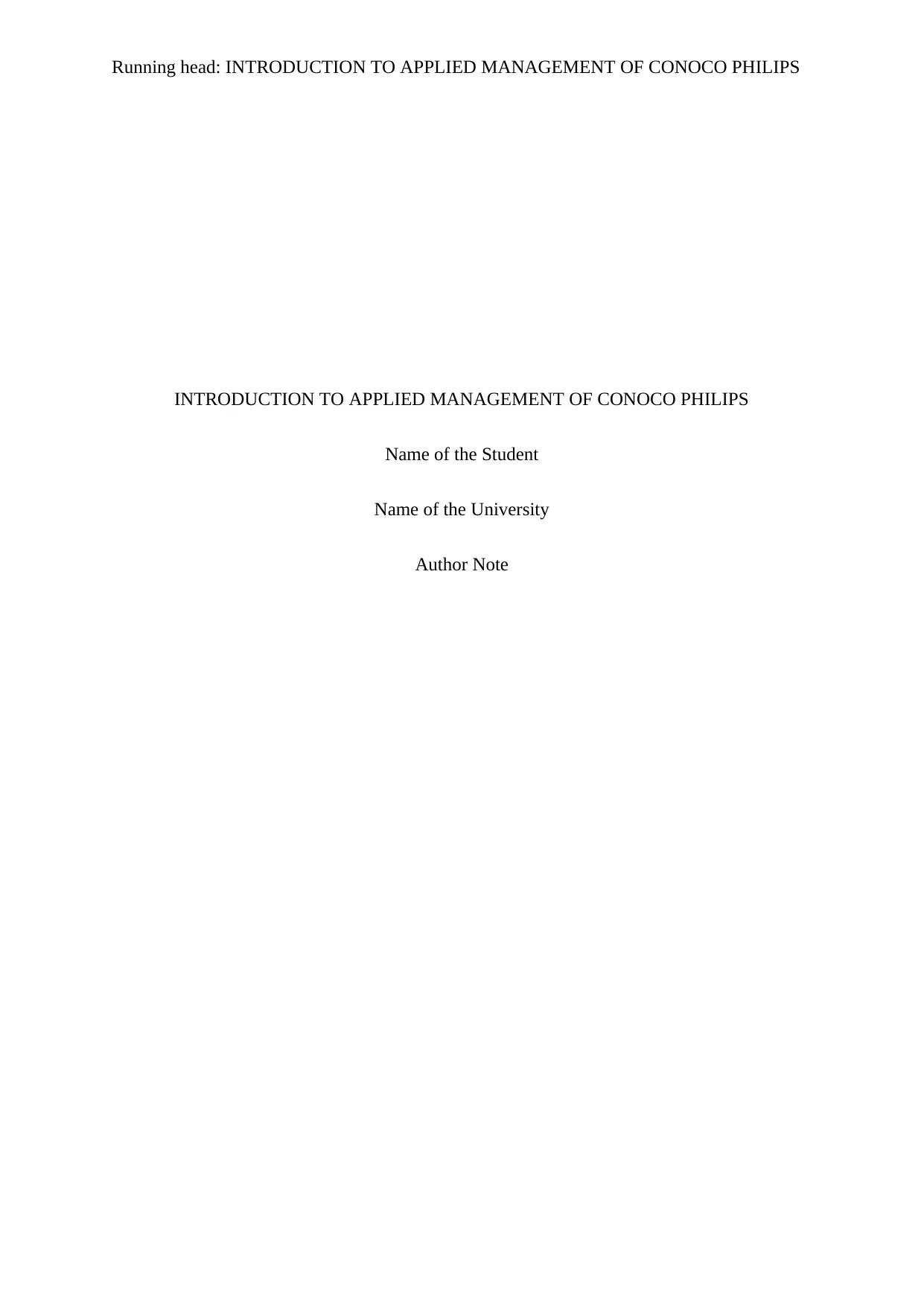
Running head: INTRODUCTION TO APPLIED MANAGEMENT OF CONOCO PHILIPS
INTRODUCTION TO APPLIED MANAGEMENT OF CONOCO PHILIPS
Name of the Student
Name of the University
Author Note
INTRODUCTION TO APPLIED MANAGEMENT OF CONOCO PHILIPS
Name of the Student
Name of the University
Author Note
Paraphrase This Document
Need a fresh take? Get an instant paraphrase of this document with our AI Paraphraser
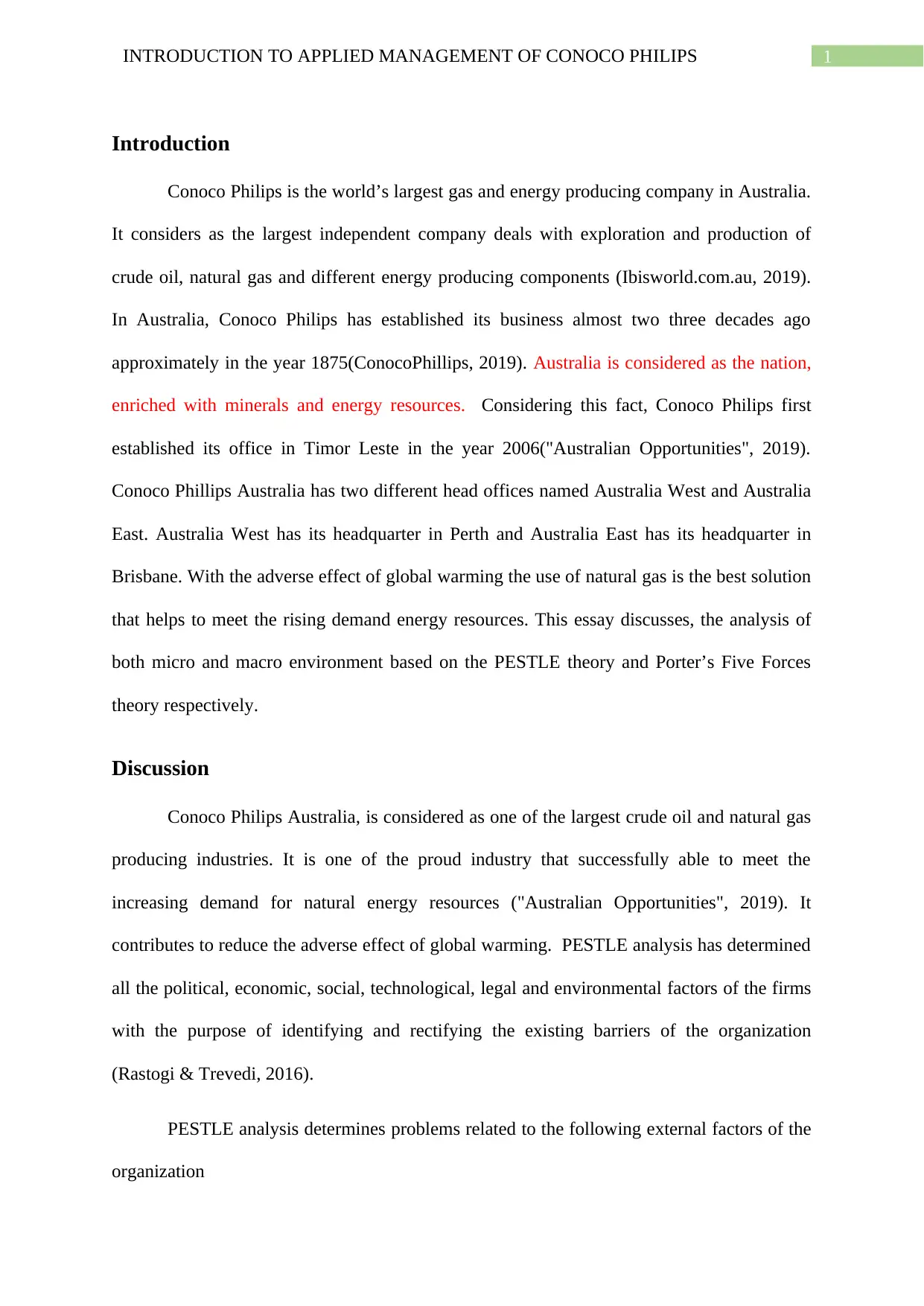
1INTRODUCTION TO APPLIED MANAGEMENT OF CONOCO PHILIPS
Introduction
Conoco Philips is the world’s largest gas and energy producing company in Australia.
It considers as the largest independent company deals with exploration and production of
crude oil, natural gas and different energy producing components (Ibisworld.com.au, 2019).
In Australia, Conoco Philips has established its business almost two three decades ago
approximately in the year 1875(ConocoPhillips, 2019). Australia is considered as the nation,
enriched with minerals and energy resources. Considering this fact, Conoco Philips first
established its office in Timor Leste in the year 2006("Australian Opportunities", 2019).
Conoco Phillips Australia has two different head offices named Australia West and Australia
East. Australia West has its headquarter in Perth and Australia East has its headquarter in
Brisbane. With the adverse effect of global warming the use of natural gas is the best solution
that helps to meet the rising demand energy resources. This essay discusses, the analysis of
both micro and macro environment based on the PESTLE theory and Porter’s Five Forces
theory respectively.
Discussion
Conoco Philips Australia, is considered as one of the largest crude oil and natural gas
producing industries. It is one of the proud industry that successfully able to meet the
increasing demand for natural energy resources ("Australian Opportunities", 2019). It
contributes to reduce the adverse effect of global warming. PESTLE analysis has determined
all the political, economic, social, technological, legal and environmental factors of the firms
with the purpose of identifying and rectifying the existing barriers of the organization
(Rastogi & Trevedi, 2016).
PESTLE analysis determines problems related to the following external factors of the
organization
Introduction
Conoco Philips is the world’s largest gas and energy producing company in Australia.
It considers as the largest independent company deals with exploration and production of
crude oil, natural gas and different energy producing components (Ibisworld.com.au, 2019).
In Australia, Conoco Philips has established its business almost two three decades ago
approximately in the year 1875(ConocoPhillips, 2019). Australia is considered as the nation,
enriched with minerals and energy resources. Considering this fact, Conoco Philips first
established its office in Timor Leste in the year 2006("Australian Opportunities", 2019).
Conoco Phillips Australia has two different head offices named Australia West and Australia
East. Australia West has its headquarter in Perth and Australia East has its headquarter in
Brisbane. With the adverse effect of global warming the use of natural gas is the best solution
that helps to meet the rising demand energy resources. This essay discusses, the analysis of
both micro and macro environment based on the PESTLE theory and Porter’s Five Forces
theory respectively.
Discussion
Conoco Philips Australia, is considered as one of the largest crude oil and natural gas
producing industries. It is one of the proud industry that successfully able to meet the
increasing demand for natural energy resources ("Australian Opportunities", 2019). It
contributes to reduce the adverse effect of global warming. PESTLE analysis has determined
all the political, economic, social, technological, legal and environmental factors of the firms
with the purpose of identifying and rectifying the existing barriers of the organization
(Rastogi & Trevedi, 2016).
PESTLE analysis determines problems related to the following external factors of the
organization
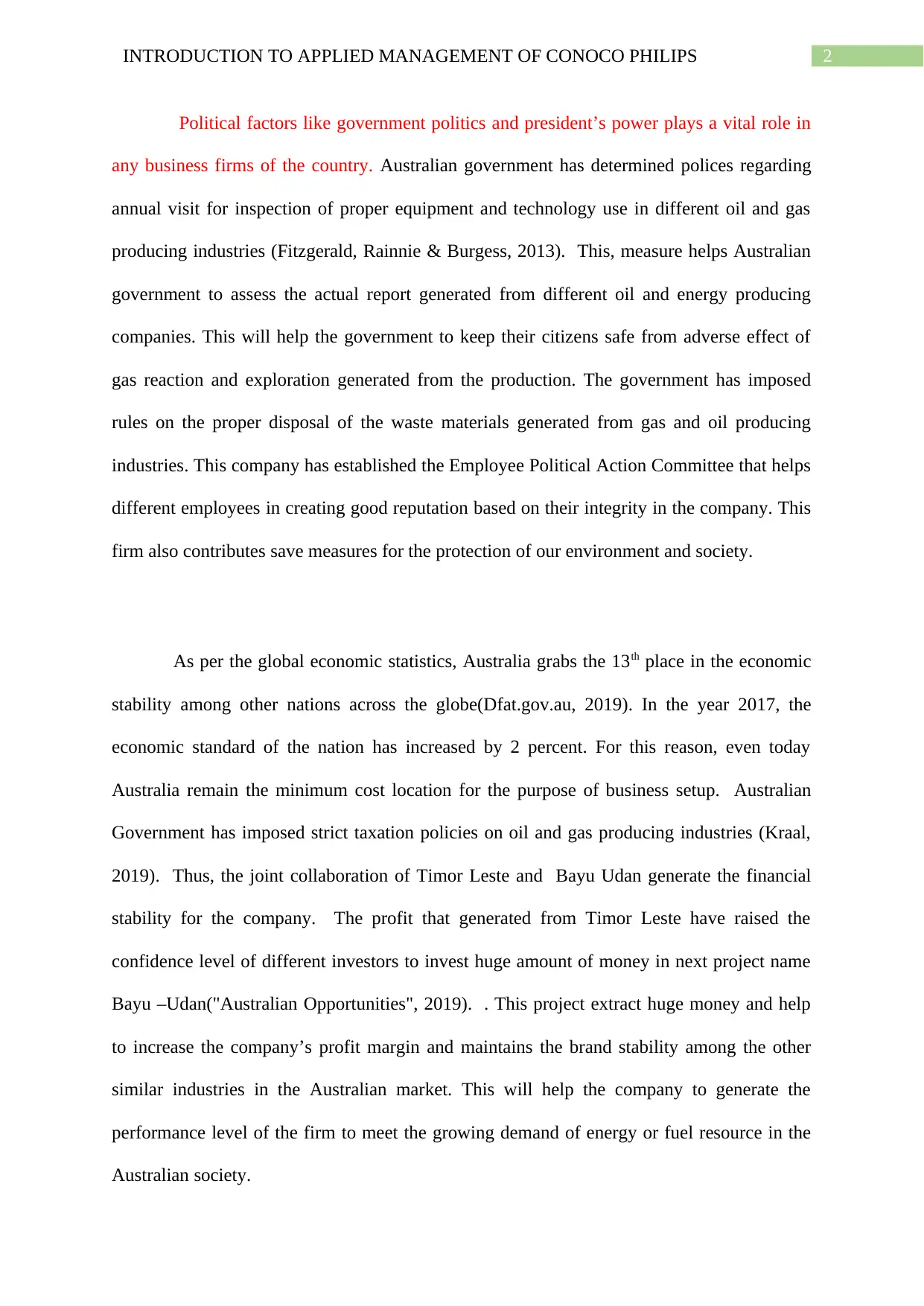
2INTRODUCTION TO APPLIED MANAGEMENT OF CONOCO PHILIPS
Political factors like government politics and president’s power plays a vital role in
any business firms of the country. Australian government has determined polices regarding
annual visit for inspection of proper equipment and technology use in different oil and gas
producing industries (Fitzgerald, Rainnie & Burgess, 2013). This, measure helps Australian
government to assess the actual report generated from different oil and energy producing
companies. This will help the government to keep their citizens safe from adverse effect of
gas reaction and exploration generated from the production. The government has imposed
rules on the proper disposal of the waste materials generated from gas and oil producing
industries. This company has established the Employee Political Action Committee that helps
different employees in creating good reputation based on their integrity in the company. This
firm also contributes save measures for the protection of our environment and society.
As per the global economic statistics, Australia grabs the 13th place in the economic
stability among other nations across the globe(Dfat.gov.au, 2019). In the year 2017, the
economic standard of the nation has increased by 2 percent. For this reason, even today
Australia remain the minimum cost location for the purpose of business setup. Australian
Government has imposed strict taxation policies on oil and gas producing industries (Kraal,
2019). Thus, the joint collaboration of Timor Leste and Bayu Udan generate the financial
stability for the company. The profit that generated from Timor Leste have raised the
confidence level of different investors to invest huge amount of money in next project name
Bayu –Udan("Australian Opportunities", 2019). . This project extract huge money and help
to increase the company’s profit margin and maintains the brand stability among the other
similar industries in the Australian market. This will help the company to generate the
performance level of the firm to meet the growing demand of energy or fuel resource in the
Australian society.
Political factors like government politics and president’s power plays a vital role in
any business firms of the country. Australian government has determined polices regarding
annual visit for inspection of proper equipment and technology use in different oil and gas
producing industries (Fitzgerald, Rainnie & Burgess, 2013). This, measure helps Australian
government to assess the actual report generated from different oil and energy producing
companies. This will help the government to keep their citizens safe from adverse effect of
gas reaction and exploration generated from the production. The government has imposed
rules on the proper disposal of the waste materials generated from gas and oil producing
industries. This company has established the Employee Political Action Committee that helps
different employees in creating good reputation based on their integrity in the company. This
firm also contributes save measures for the protection of our environment and society.
As per the global economic statistics, Australia grabs the 13th place in the economic
stability among other nations across the globe(Dfat.gov.au, 2019). In the year 2017, the
economic standard of the nation has increased by 2 percent. For this reason, even today
Australia remain the minimum cost location for the purpose of business setup. Australian
Government has imposed strict taxation policies on oil and gas producing industries (Kraal,
2019). Thus, the joint collaboration of Timor Leste and Bayu Udan generate the financial
stability for the company. The profit that generated from Timor Leste have raised the
confidence level of different investors to invest huge amount of money in next project name
Bayu –Udan("Australian Opportunities", 2019). . This project extract huge money and help
to increase the company’s profit margin and maintains the brand stability among the other
similar industries in the Australian market. This will help the company to generate the
performance level of the firm to meet the growing demand of energy or fuel resource in the
Australian society.
⊘ This is a preview!⊘
Do you want full access?
Subscribe today to unlock all pages.

Trusted by 1+ million students worldwide
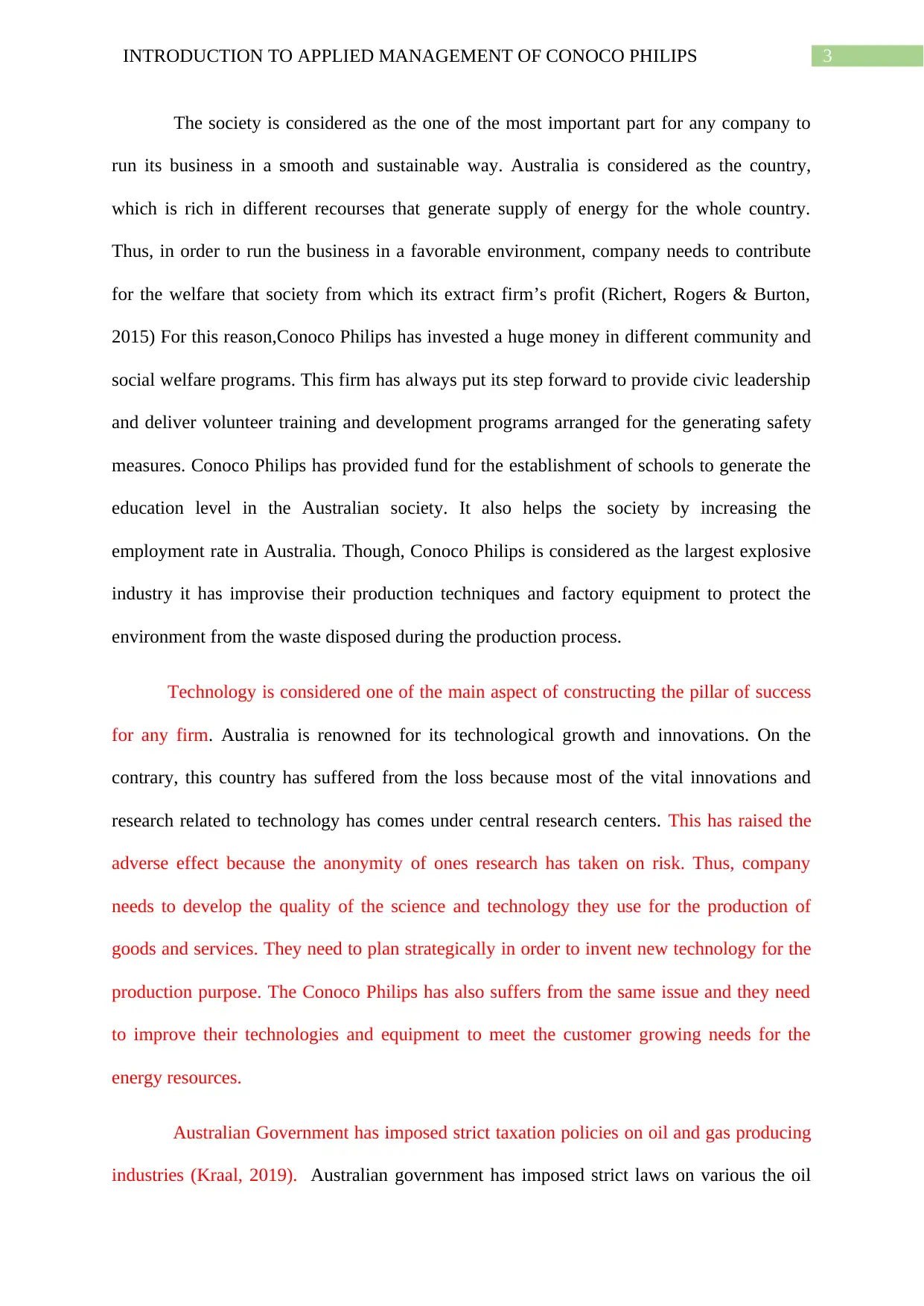
3INTRODUCTION TO APPLIED MANAGEMENT OF CONOCO PHILIPS
The society is considered as the one of the most important part for any company to
run its business in a smooth and sustainable way. Australia is considered as the country,
which is rich in different recourses that generate supply of energy for the whole country.
Thus, in order to run the business in a favorable environment, company needs to contribute
for the welfare that society from which its extract firm’s profit (Richert, Rogers & Burton,
2015) For this reason,Conoco Philips has invested a huge money in different community and
social welfare programs. This firm has always put its step forward to provide civic leadership
and deliver volunteer training and development programs arranged for the generating safety
measures. Conoco Philips has provided fund for the establishment of schools to generate the
education level in the Australian society. It also helps the society by increasing the
employment rate in Australia. Though, Conoco Philips is considered as the largest explosive
industry it has improvise their production techniques and factory equipment to protect the
environment from the waste disposed during the production process.
Technology is considered one of the main aspect of constructing the pillar of success
for any firm. Australia is renowned for its technological growth and innovations. On the
contrary, this country has suffered from the loss because most of the vital innovations and
research related to technology has comes under central research centers. This has raised the
adverse effect because the anonymity of ones research has taken on risk. Thus, company
needs to develop the quality of the science and technology they use for the production of
goods and services. They need to plan strategically in order to invent new technology for the
production purpose. The Conoco Philips has also suffers from the same issue and they need
to improve their technologies and equipment to meet the customer growing needs for the
energy resources.
Australian Government has imposed strict taxation policies on oil and gas producing
industries (Kraal, 2019). Australian government has imposed strict laws on various the oil
The society is considered as the one of the most important part for any company to
run its business in a smooth and sustainable way. Australia is considered as the country,
which is rich in different recourses that generate supply of energy for the whole country.
Thus, in order to run the business in a favorable environment, company needs to contribute
for the welfare that society from which its extract firm’s profit (Richert, Rogers & Burton,
2015) For this reason,Conoco Philips has invested a huge money in different community and
social welfare programs. This firm has always put its step forward to provide civic leadership
and deliver volunteer training and development programs arranged for the generating safety
measures. Conoco Philips has provided fund for the establishment of schools to generate the
education level in the Australian society. It also helps the society by increasing the
employment rate in Australia. Though, Conoco Philips is considered as the largest explosive
industry it has improvise their production techniques and factory equipment to protect the
environment from the waste disposed during the production process.
Technology is considered one of the main aspect of constructing the pillar of success
for any firm. Australia is renowned for its technological growth and innovations. On the
contrary, this country has suffered from the loss because most of the vital innovations and
research related to technology has comes under central research centers. This has raised the
adverse effect because the anonymity of ones research has taken on risk. Thus, company
needs to develop the quality of the science and technology they use for the production of
goods and services. They need to plan strategically in order to invent new technology for the
production purpose. The Conoco Philips has also suffers from the same issue and they need
to improve their technologies and equipment to meet the customer growing needs for the
energy resources.
Australian Government has imposed strict taxation policies on oil and gas producing
industries (Kraal, 2019). Australian government has imposed strict laws on various the oil
Paraphrase This Document
Need a fresh take? Get an instant paraphrase of this document with our AI Paraphraser
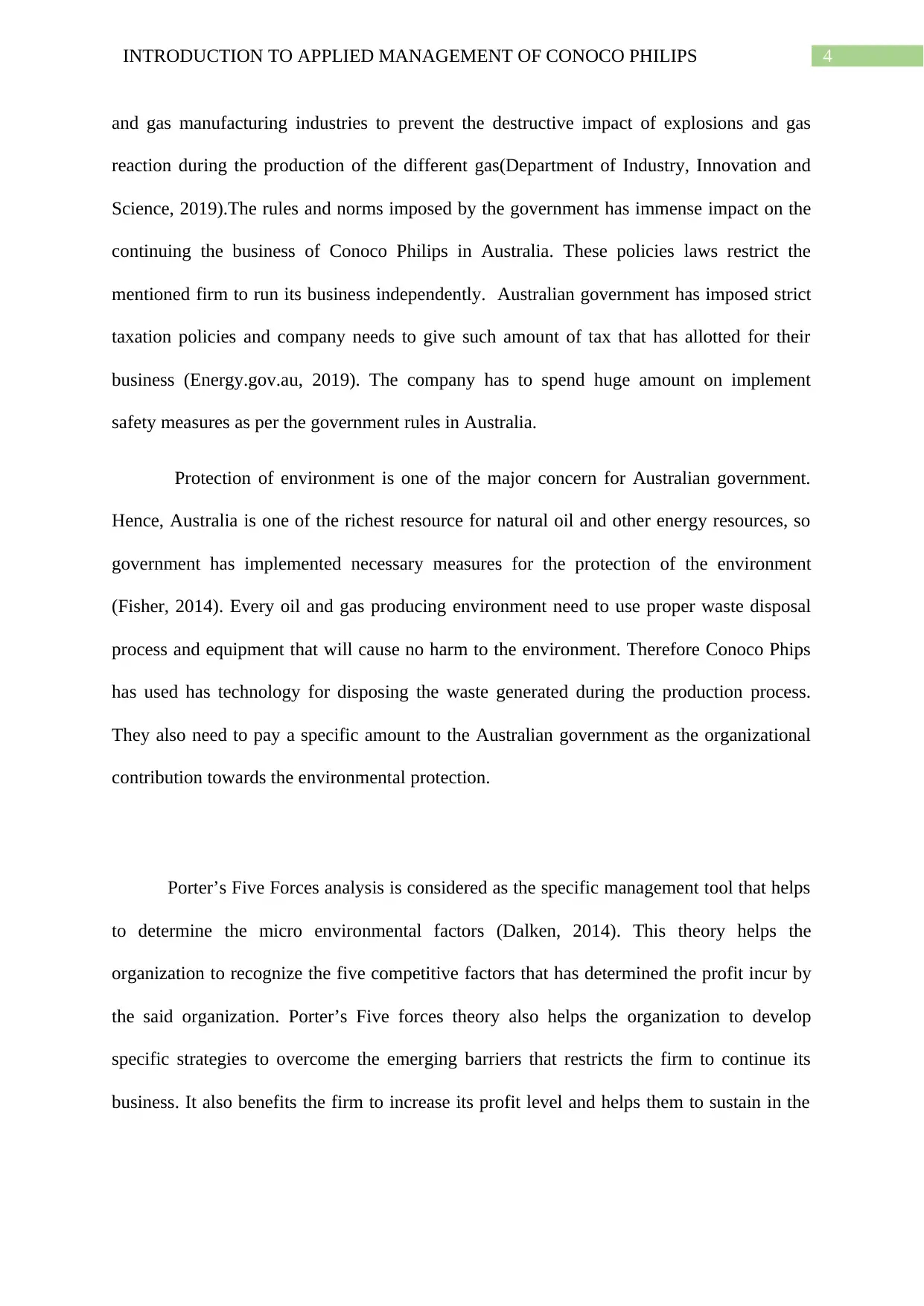
4INTRODUCTION TO APPLIED MANAGEMENT OF CONOCO PHILIPS
and gas manufacturing industries to prevent the destructive impact of explosions and gas
reaction during the production of the different gas(Department of Industry, Innovation and
Science, 2019).The rules and norms imposed by the government has immense impact on the
continuing the business of Conoco Philips in Australia. These policies laws restrict the
mentioned firm to run its business independently. Australian government has imposed strict
taxation policies and company needs to give such amount of tax that has allotted for their
business (Energy.gov.au, 2019). The company has to spend huge amount on implement
safety measures as per the government rules in Australia.
Protection of environment is one of the major concern for Australian government.
Hence, Australia is one of the richest resource for natural oil and other energy resources, so
government has implemented necessary measures for the protection of the environment
(Fisher, 2014). Every oil and gas producing environment need to use proper waste disposal
process and equipment that will cause no harm to the environment. Therefore Conoco Phips
has used has technology for disposing the waste generated during the production process.
They also need to pay a specific amount to the Australian government as the organizational
contribution towards the environmental protection.
Porter’s Five Forces analysis is considered as the specific management tool that helps
to determine the micro environmental factors (Dalken, 2014). This theory helps the
organization to recognize the five competitive factors that has determined the profit incur by
the said organization. Porter’s Five forces theory also helps the organization to develop
specific strategies to overcome the emerging barriers that restricts the firm to continue its
business. It also benefits the firm to increase its profit level and helps them to sustain in the
and gas manufacturing industries to prevent the destructive impact of explosions and gas
reaction during the production of the different gas(Department of Industry, Innovation and
Science, 2019).The rules and norms imposed by the government has immense impact on the
continuing the business of Conoco Philips in Australia. These policies laws restrict the
mentioned firm to run its business independently. Australian government has imposed strict
taxation policies and company needs to give such amount of tax that has allotted for their
business (Energy.gov.au, 2019). The company has to spend huge amount on implement
safety measures as per the government rules in Australia.
Protection of environment is one of the major concern for Australian government.
Hence, Australia is one of the richest resource for natural oil and other energy resources, so
government has implemented necessary measures for the protection of the environment
(Fisher, 2014). Every oil and gas producing environment need to use proper waste disposal
process and equipment that will cause no harm to the environment. Therefore Conoco Phips
has used has technology for disposing the waste generated during the production process.
They also need to pay a specific amount to the Australian government as the organizational
contribution towards the environmental protection.
Porter’s Five Forces analysis is considered as the specific management tool that helps
to determine the micro environmental factors (Dalken, 2014). This theory helps the
organization to recognize the five competitive factors that has determined the profit incur by
the said organization. Porter’s Five forces theory also helps the organization to develop
specific strategies to overcome the emerging barriers that restricts the firm to continue its
business. It also benefits the firm to increase its profit level and helps them to sustain in the
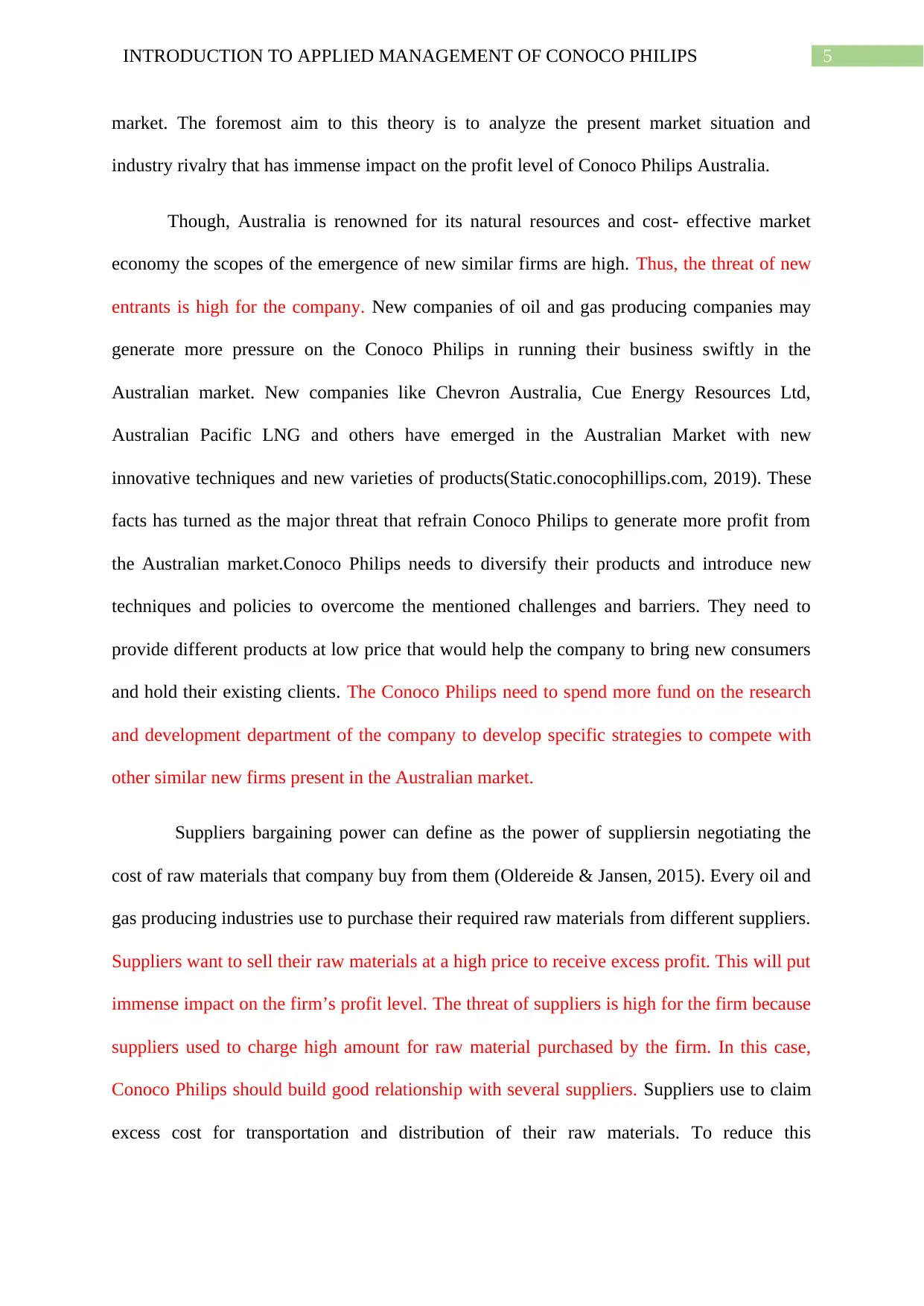
5INTRODUCTION TO APPLIED MANAGEMENT OF CONOCO PHILIPS
market. The foremost aim to this theory is to analyze the present market situation and
industry rivalry that has immense impact on the profit level of Conoco Philips Australia.
Though, Australia is renowned for its natural resources and cost- effective market
economy the scopes of the emergence of new similar firms are high. Thus, the threat of new
entrants is high for the company. New companies of oil and gas producing companies may
generate more pressure on the Conoco Philips in running their business swiftly in the
Australian market. New companies like Chevron Australia, Cue Energy Resources Ltd,
Australian Pacific LNG and others have emerged in the Australian Market with new
innovative techniques and new varieties of products(Static.conocophillips.com, 2019). These
facts has turned as the major threat that refrain Conoco Philips to generate more profit from
the Australian market.Conoco Philips needs to diversify their products and introduce new
techniques and policies to overcome the mentioned challenges and barriers. They need to
provide different products at low price that would help the company to bring new consumers
and hold their existing clients. The Conoco Philips need to spend more fund on the research
and development department of the company to develop specific strategies to compete with
other similar new firms present in the Australian market.
Suppliers bargaining power can define as the power of suppliersin negotiating the
cost of raw materials that company buy from them (Oldereide & Jansen, 2015). Every oil and
gas producing industries use to purchase their required raw materials from different suppliers.
Suppliers want to sell their raw materials at a high price to receive excess profit. This will put
immense impact on the firm’s profit level. The threat of suppliers is high for the firm because
suppliers used to charge high amount for raw material purchased by the firm. In this case,
Conoco Philips should build good relationship with several suppliers. Suppliers use to claim
excess cost for transportation and distribution of their raw materials. To reduce this
market. The foremost aim to this theory is to analyze the present market situation and
industry rivalry that has immense impact on the profit level of Conoco Philips Australia.
Though, Australia is renowned for its natural resources and cost- effective market
economy the scopes of the emergence of new similar firms are high. Thus, the threat of new
entrants is high for the company. New companies of oil and gas producing companies may
generate more pressure on the Conoco Philips in running their business swiftly in the
Australian market. New companies like Chevron Australia, Cue Energy Resources Ltd,
Australian Pacific LNG and others have emerged in the Australian Market with new
innovative techniques and new varieties of products(Static.conocophillips.com, 2019). These
facts has turned as the major threat that refrain Conoco Philips to generate more profit from
the Australian market.Conoco Philips needs to diversify their products and introduce new
techniques and policies to overcome the mentioned challenges and barriers. They need to
provide different products at low price that would help the company to bring new consumers
and hold their existing clients. The Conoco Philips need to spend more fund on the research
and development department of the company to develop specific strategies to compete with
other similar new firms present in the Australian market.
Suppliers bargaining power can define as the power of suppliersin negotiating the
cost of raw materials that company buy from them (Oldereide & Jansen, 2015). Every oil and
gas producing industries use to purchase their required raw materials from different suppliers.
Suppliers want to sell their raw materials at a high price to receive excess profit. This will put
immense impact on the firm’s profit level. The threat of suppliers is high for the firm because
suppliers used to charge high amount for raw material purchased by the firm. In this case,
Conoco Philips should build good relationship with several suppliers. Suppliers use to claim
excess cost for transportation and distribution of their raw materials. To reduce this
⊘ This is a preview!⊘
Do you want full access?
Subscribe today to unlock all pages.

Trusted by 1+ million students worldwide
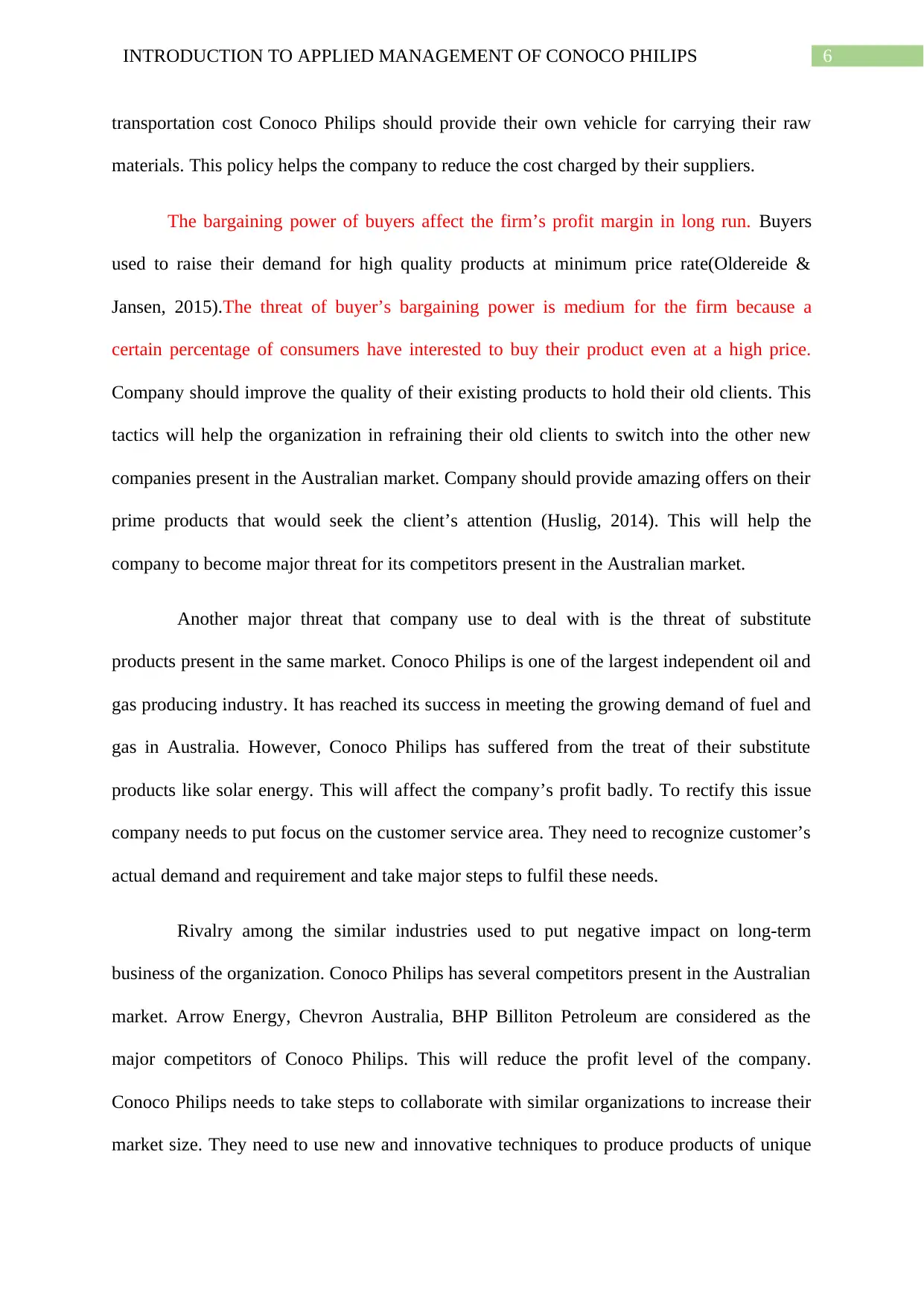
6INTRODUCTION TO APPLIED MANAGEMENT OF CONOCO PHILIPS
transportation cost Conoco Philips should provide their own vehicle for carrying their raw
materials. This policy helps the company to reduce the cost charged by their suppliers.
The bargaining power of buyers affect the firm’s profit margin in long run. Buyers
used to raise their demand for high quality products at minimum price rate(Oldereide &
Jansen, 2015).The threat of buyer’s bargaining power is medium for the firm because a
certain percentage of consumers have interested to buy their product even at a high price.
Company should improve the quality of their existing products to hold their old clients. This
tactics will help the organization in refraining their old clients to switch into the other new
companies present in the Australian market. Company should provide amazing offers on their
prime products that would seek the client’s attention (Huslig, 2014). This will help the
company to become major threat for its competitors present in the Australian market.
Another major threat that company use to deal with is the threat of substitute
products present in the same market. Conoco Philips is one of the largest independent oil and
gas producing industry. It has reached its success in meeting the growing demand of fuel and
gas in Australia. However, Conoco Philips has suffered from the treat of their substitute
products like solar energy. This will affect the company’s profit badly. To rectify this issue
company needs to put focus on the customer service area. They need to recognize customer’s
actual demand and requirement and take major steps to fulfil these needs.
Rivalry among the similar industries used to put negative impact on long-term
business of the organization. Conoco Philips has several competitors present in the Australian
market. Arrow Energy, Chevron Australia, BHP Billiton Petroleum are considered as the
major competitors of Conoco Philips. This will reduce the profit level of the company.
Conoco Philips needs to take steps to collaborate with similar organizations to increase their
market size. They need to use new and innovative techniques to produce products of unique
transportation cost Conoco Philips should provide their own vehicle for carrying their raw
materials. This policy helps the company to reduce the cost charged by their suppliers.
The bargaining power of buyers affect the firm’s profit margin in long run. Buyers
used to raise their demand for high quality products at minimum price rate(Oldereide &
Jansen, 2015).The threat of buyer’s bargaining power is medium for the firm because a
certain percentage of consumers have interested to buy their product even at a high price.
Company should improve the quality of their existing products to hold their old clients. This
tactics will help the organization in refraining their old clients to switch into the other new
companies present in the Australian market. Company should provide amazing offers on their
prime products that would seek the client’s attention (Huslig, 2014). This will help the
company to become major threat for its competitors present in the Australian market.
Another major threat that company use to deal with is the threat of substitute
products present in the same market. Conoco Philips is one of the largest independent oil and
gas producing industry. It has reached its success in meeting the growing demand of fuel and
gas in Australia. However, Conoco Philips has suffered from the treat of their substitute
products like solar energy. This will affect the company’s profit badly. To rectify this issue
company needs to put focus on the customer service area. They need to recognize customer’s
actual demand and requirement and take major steps to fulfil these needs.
Rivalry among the similar industries used to put negative impact on long-term
business of the organization. Conoco Philips has several competitors present in the Australian
market. Arrow Energy, Chevron Australia, BHP Billiton Petroleum are considered as the
major competitors of Conoco Philips. This will reduce the profit level of the company.
Conoco Philips needs to take steps to collaborate with similar organizations to increase their
market size. They need to use new and innovative techniques to produce products of unique
Paraphrase This Document
Need a fresh take? Get an instant paraphrase of this document with our AI Paraphraser
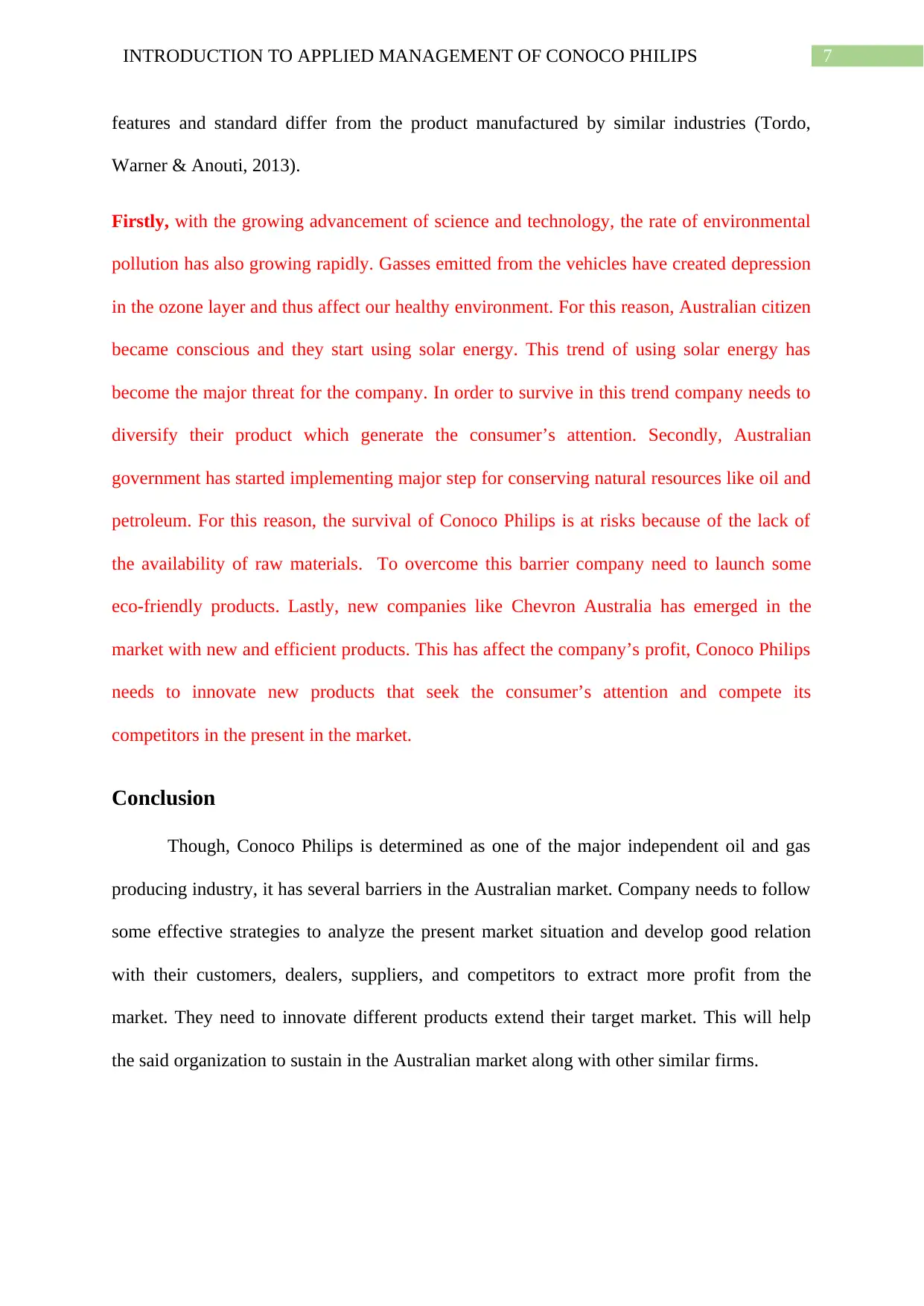
7INTRODUCTION TO APPLIED MANAGEMENT OF CONOCO PHILIPS
features and standard differ from the product manufactured by similar industries (Tordo,
Warner & Anouti, 2013).
Firstly, with the growing advancement of science and technology, the rate of environmental
pollution has also growing rapidly. Gasses emitted from the vehicles have created depression
in the ozone layer and thus affect our healthy environment. For this reason, Australian citizen
became conscious and they start using solar energy. This trend of using solar energy has
become the major threat for the company. In order to survive in this trend company needs to
diversify their product which generate the consumer’s attention. Secondly, Australian
government has started implementing major step for conserving natural resources like oil and
petroleum. For this reason, the survival of Conoco Philips is at risks because of the lack of
the availability of raw materials. To overcome this barrier company need to launch some
eco-friendly products. Lastly, new companies like Chevron Australia has emerged in the
market with new and efficient products. This has affect the company’s profit, Conoco Philips
needs to innovate new products that seek the consumer’s attention and compete its
competitors in the present in the market.
Conclusion
Though, Conoco Philips is determined as one of the major independent oil and gas
producing industry, it has several barriers in the Australian market. Company needs to follow
some effective strategies to analyze the present market situation and develop good relation
with their customers, dealers, suppliers, and competitors to extract more profit from the
market. They need to innovate different products extend their target market. This will help
the said organization to sustain in the Australian market along with other similar firms.
features and standard differ from the product manufactured by similar industries (Tordo,
Warner & Anouti, 2013).
Firstly, with the growing advancement of science and technology, the rate of environmental
pollution has also growing rapidly. Gasses emitted from the vehicles have created depression
in the ozone layer and thus affect our healthy environment. For this reason, Australian citizen
became conscious and they start using solar energy. This trend of using solar energy has
become the major threat for the company. In order to survive in this trend company needs to
diversify their product which generate the consumer’s attention. Secondly, Australian
government has started implementing major step for conserving natural resources like oil and
petroleum. For this reason, the survival of Conoco Philips is at risks because of the lack of
the availability of raw materials. To overcome this barrier company need to launch some
eco-friendly products. Lastly, new companies like Chevron Australia has emerged in the
market with new and efficient products. This has affect the company’s profit, Conoco Philips
needs to innovate new products that seek the consumer’s attention and compete its
competitors in the present in the market.
Conclusion
Though, Conoco Philips is determined as one of the major independent oil and gas
producing industry, it has several barriers in the Australian market. Company needs to follow
some effective strategies to analyze the present market situation and develop good relation
with their customers, dealers, suppliers, and competitors to extract more profit from the
market. They need to innovate different products extend their target market. This will help
the said organization to sustain in the Australian market along with other similar firms.
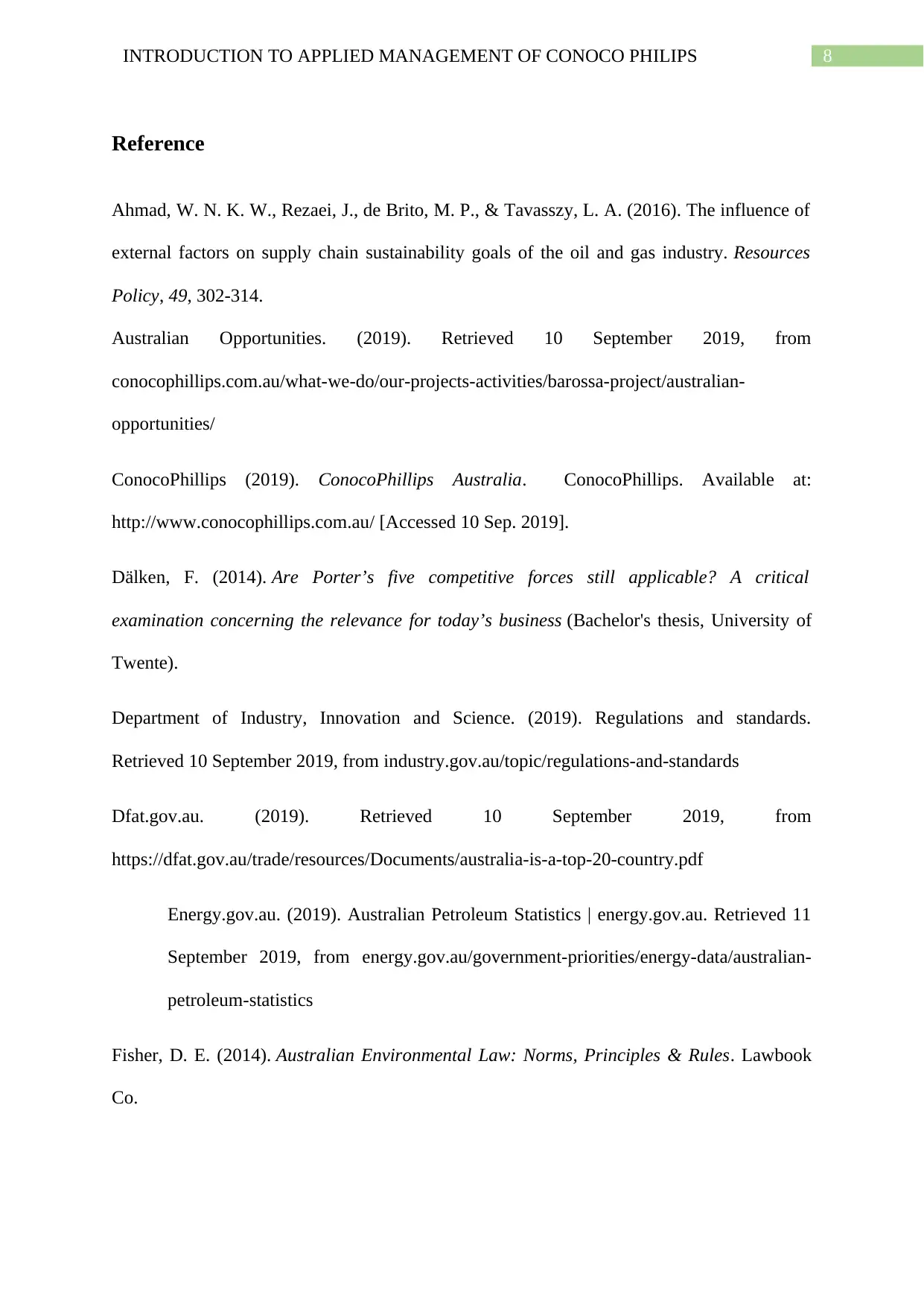
8INTRODUCTION TO APPLIED MANAGEMENT OF CONOCO PHILIPS
Reference
Ahmad, W. N. K. W., Rezaei, J., de Brito, M. P., & Tavasszy, L. A. (2016). The influence of
external factors on supply chain sustainability goals of the oil and gas industry. Resources
Policy, 49, 302-314.
Australian Opportunities. (2019). Retrieved 10 September 2019, from
conocophillips.com.au/what-we-do/our-projects-activities/barossa-project/australian-
opportunities/
ConocoPhillips (2019). ConocoPhillips Australia. ConocoPhillips. Available at:
http://www.conocophillips.com.au/ [Accessed 10 Sep. 2019].
Dälken, F. (2014). Are Porter’s five competitive forces still applicable? A critical
examination concerning the relevance for today’s business (Bachelor's thesis, University of
Twente).
Department of Industry, Innovation and Science. (2019). Regulations and standards.
Retrieved 10 September 2019, from industry.gov.au/topic/regulations-and-standards
Dfat.gov.au. (2019). Retrieved 10 September 2019, from
https://dfat.gov.au/trade/resources/Documents/australia-is-a-top-20-country.pdf
Energy.gov.au. (2019). Australian Petroleum Statistics | energy.gov.au. Retrieved 11
September 2019, from energy.gov.au/government-priorities/energy-data/australian-
petroleum-statistics
Fisher, D. E. (2014). Australian Environmental Law: Norms, Principles & Rules. Lawbook
Co.
Reference
Ahmad, W. N. K. W., Rezaei, J., de Brito, M. P., & Tavasszy, L. A. (2016). The influence of
external factors on supply chain sustainability goals of the oil and gas industry. Resources
Policy, 49, 302-314.
Australian Opportunities. (2019). Retrieved 10 September 2019, from
conocophillips.com.au/what-we-do/our-projects-activities/barossa-project/australian-
opportunities/
ConocoPhillips (2019). ConocoPhillips Australia. ConocoPhillips. Available at:
http://www.conocophillips.com.au/ [Accessed 10 Sep. 2019].
Dälken, F. (2014). Are Porter’s five competitive forces still applicable? A critical
examination concerning the relevance for today’s business (Bachelor's thesis, University of
Twente).
Department of Industry, Innovation and Science. (2019). Regulations and standards.
Retrieved 10 September 2019, from industry.gov.au/topic/regulations-and-standards
Dfat.gov.au. (2019). Retrieved 10 September 2019, from
https://dfat.gov.au/trade/resources/Documents/australia-is-a-top-20-country.pdf
Energy.gov.au. (2019). Australian Petroleum Statistics | energy.gov.au. Retrieved 11
September 2019, from energy.gov.au/government-priorities/energy-data/australian-
petroleum-statistics
Fisher, D. E. (2014). Australian Environmental Law: Norms, Principles & Rules. Lawbook
Co.
⊘ This is a preview!⊘
Do you want full access?
Subscribe today to unlock all pages.

Trusted by 1+ million students worldwide
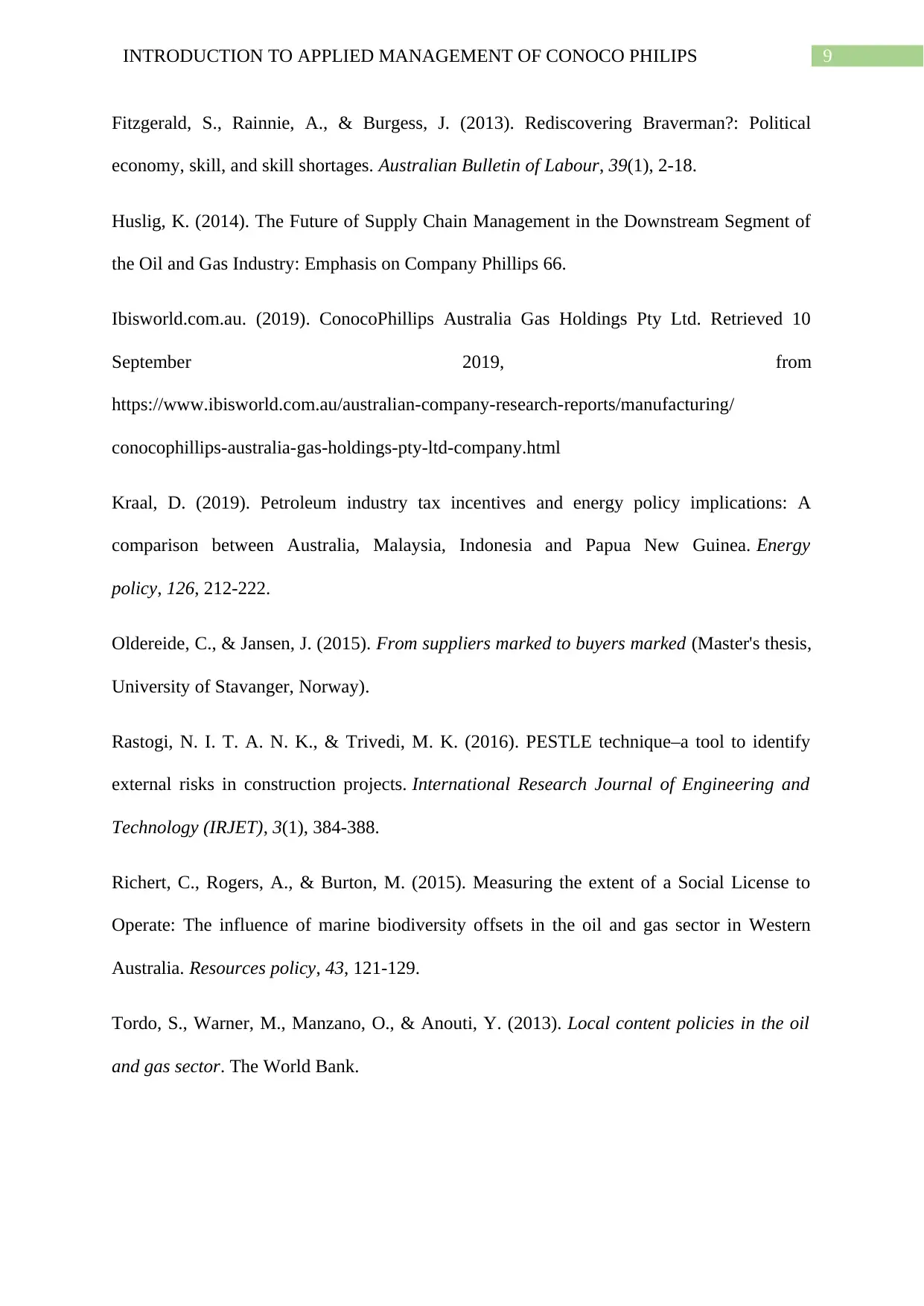
9INTRODUCTION TO APPLIED MANAGEMENT OF CONOCO PHILIPS
Fitzgerald, S., Rainnie, A., & Burgess, J. (2013). Rediscovering Braverman?: Political
economy, skill, and skill shortages. Australian Bulletin of Labour, 39(1), 2-18.
Huslig, K. (2014). The Future of Supply Chain Management in the Downstream Segment of
the Oil and Gas Industry: Emphasis on Company Phillips 66.
Ibisworld.com.au. (2019). ConocoPhillips Australia Gas Holdings Pty Ltd. Retrieved 10
September 2019, from
https://www.ibisworld.com.au/australian-company-research-reports/manufacturing/
conocophillips-australia-gas-holdings-pty-ltd-company.html
Kraal, D. (2019). Petroleum industry tax incentives and energy policy implications: A
comparison between Australia, Malaysia, Indonesia and Papua New Guinea. Energy
policy, 126, 212-222.
Oldereide, C., & Jansen, J. (2015). From suppliers marked to buyers marked (Master's thesis,
University of Stavanger, Norway).
Rastogi, N. I. T. A. N. K., & Trivedi, M. K. (2016). PESTLE technique–a tool to identify
external risks in construction projects. International Research Journal of Engineering and
Technology (IRJET), 3(1), 384-388.
Richert, C., Rogers, A., & Burton, M. (2015). Measuring the extent of a Social License to
Operate: The influence of marine biodiversity offsets in the oil and gas sector in Western
Australia. Resources policy, 43, 121-129.
Tordo, S., Warner, M., Manzano, O., & Anouti, Y. (2013). Local content policies in the oil
and gas sector. The World Bank.
Fitzgerald, S., Rainnie, A., & Burgess, J. (2013). Rediscovering Braverman?: Political
economy, skill, and skill shortages. Australian Bulletin of Labour, 39(1), 2-18.
Huslig, K. (2014). The Future of Supply Chain Management in the Downstream Segment of
the Oil and Gas Industry: Emphasis on Company Phillips 66.
Ibisworld.com.au. (2019). ConocoPhillips Australia Gas Holdings Pty Ltd. Retrieved 10
September 2019, from
https://www.ibisworld.com.au/australian-company-research-reports/manufacturing/
conocophillips-australia-gas-holdings-pty-ltd-company.html
Kraal, D. (2019). Petroleum industry tax incentives and energy policy implications: A
comparison between Australia, Malaysia, Indonesia and Papua New Guinea. Energy
policy, 126, 212-222.
Oldereide, C., & Jansen, J. (2015). From suppliers marked to buyers marked (Master's thesis,
University of Stavanger, Norway).
Rastogi, N. I. T. A. N. K., & Trivedi, M. K. (2016). PESTLE technique–a tool to identify
external risks in construction projects. International Research Journal of Engineering and
Technology (IRJET), 3(1), 384-388.
Richert, C., Rogers, A., & Burton, M. (2015). Measuring the extent of a Social License to
Operate: The influence of marine biodiversity offsets in the oil and gas sector in Western
Australia. Resources policy, 43, 121-129.
Tordo, S., Warner, M., Manzano, O., & Anouti, Y. (2013). Local content policies in the oil
and gas sector. The World Bank.
1 out of 10
Related Documents
Your All-in-One AI-Powered Toolkit for Academic Success.
+13062052269
info@desklib.com
Available 24*7 on WhatsApp / Email
![[object Object]](/_next/static/media/star-bottom.7253800d.svg)
Unlock your academic potential
Copyright © 2020–2026 A2Z Services. All Rights Reserved. Developed and managed by ZUCOL.





